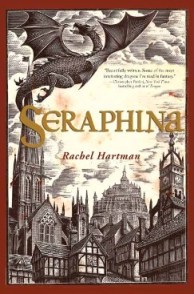Random House, 2012
B+
(This review originally posted to www.facebook.com/fjrtitchenell, now archived here as well for your convenience!)
While the inclusion of an extensive glossary and character guide is likely a great help to anyone who notices them before finishing the text of Seraphina (non-ereader users, presumably), they also warn, rightly so, of a dense, complex, and confusing enough read to warrant them.
In the delicate balance between lack of vital information and dragging, unnatural excesses of explanation, Hartman opts to err on the side of the former, tossing the reader headlong into the story’s fully formed universe, full of its own intricate politics and religious structure and terminology.
In spite of the time this saves, the beginning is as unhurried as it is disorienting, heavy on introspection and character backstory. All meaningful conflict takes its time arising, and only the richness of the world and the cleverness of Seraphina Dombeigh’s voice inspire the necessary trust that it ever will, and that the idiosyncrasies of that world as described through that voice will have become intuitive enough by the time it does to allow it to be understood.
Luckily, the world is that rich, the voice is that clever, and that trust is not betrayed.
To say that the narrative ever picks up its pace would not be quite accurate, but it does eventually amble its way through a good story, and Seraphina’s mind is an interesting enough place to linger during the downtime. Hers is the classic tale of the child of two worlds who fits into neither, told with a realistic and relatable bite of frustration and detachment, tempered with a neo-courtly wit that often demands to be read with highlighter in hand.
The source of all tension in Seraphina’s world and in her own life, thanks to her inconveniently mixed heritage, is cultural friction and an unstable truce between humans and dragons, which is portrayed with refreshing complexity for a fantasy feud. Hartman’s brand of dragons can take human form, bringing the conventions of the YA “creature” subgenre within reach. Their attitudes, on the other hand, their pathological insensitivity and powerful but rigid intellect, are far enough removed from humanity (if conspicuously reminiscent of Vulcan culture) to make them an infuriating yet morally grey and occasionally endearing foil for their human counterparts.
Seraphina, as well as a reluctant player in her world’s politics, is a musician, and her musical talent is not the tacked on and unconvincing indicator of depth that it so easily could be. Rather, music seems the intuitive form of expression of a half human half dragon, with its technical complexities and raw, intangible emotional effect, which Hartman evokes with remarkable accuracy through the silent, printed words on the page.
In spite of Seraphina’s necessary shyness, the other main characters are also vivid and engaging through her eyes. Princess Glisselda is a refreshing change from the blandly blameless or unforgivably spoiled extremes so many princess characters reach. She’s understandably sheltered, self-centered, and methodically indoctrinated but inherently well-meaning and intelligent. Prince Lucian Kiggs makes for a charming and surprisingly down-to-earth love interest, and the chemistry he shares with Seraphina is strong and lifelike enough to draw tears and leave the reader ready to embark on any sequel adventure, however leisurely a stroll it may be.







